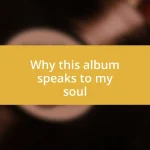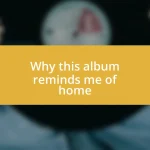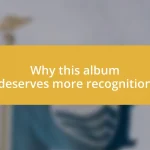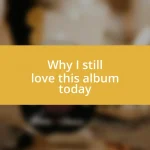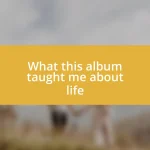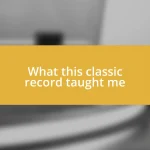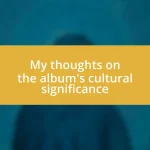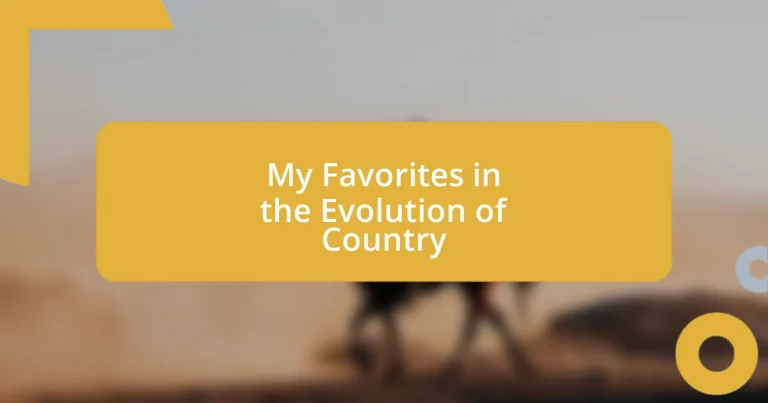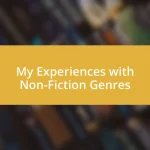Key takeaways:
- The 1927 Bristol Sessions marked the “Big Bang” of country music, launching iconic artists like the Carter Family and Jimmie Rodgers.
- The emergence of the Grand Ole Opry in the 1920s transformed country music by creating a sense of community and bringing the genre into American households.
- Modern trends in country music feature genre blending, increased representation of diverse voices, and the influence of technology on music production and consumption.
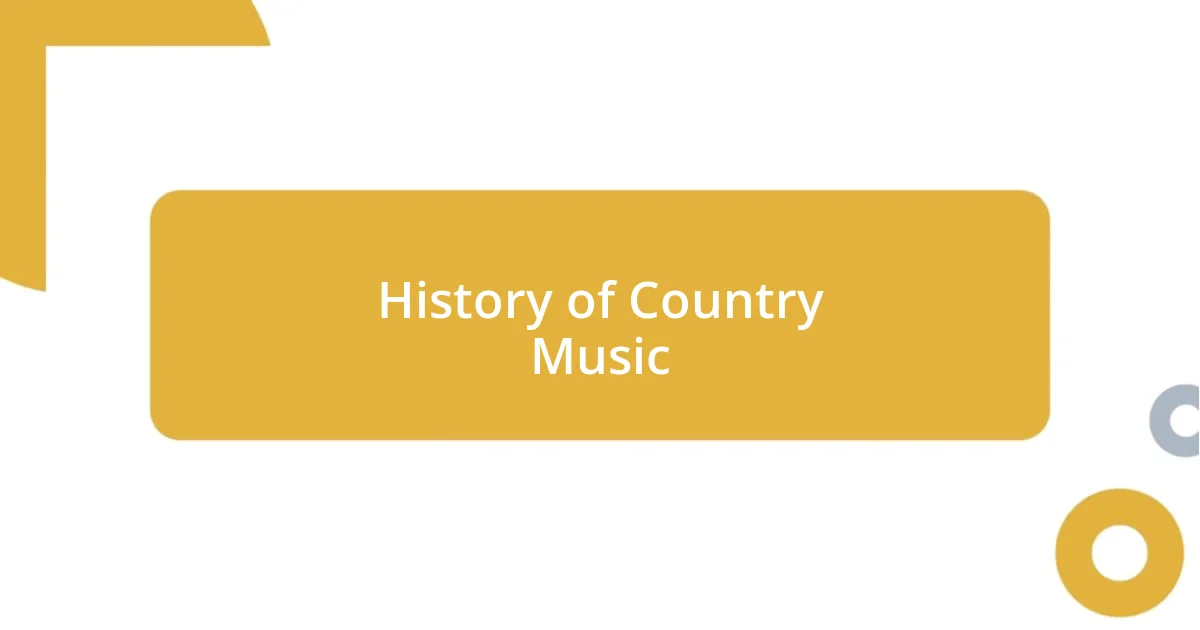
History of Country Music
Country music has deep roots in American history, intertwining elements from folk, blues, and gospel. I remember the first time I heard a classic Johnny Cash song; it struck a chord in me, reflecting the struggles and stories of everyday life. How incredible is it that this genre, born in the Appalachian mountains in the early 1900s, continues to resonate with so many?
The 1927 Bristol Sessions are often hailed as the “Big Bang” of country music, launching the careers of iconic artists like the Carter Family and Jimmie Rodgers. I still picture myself listening to their music late at night, feeling their emotions wash over me like a warm blanket, making me wonder: what was it like for them to perform in such a transformative era? Their songs, filled with heartache and joy, painted a vivid picture of the American experience.
As the decades passed, country music evolved, embracing influences from rock and pop, leading to the rise of stars like Dolly Parton and Garth Brooks. I find it fascinating how today’s country artists continue to reflect the changing social landscape. Isn’t it amazing how a genre that started off in small, regional settings now draws massive crowds at festivals, uniting fans from all walks of life?
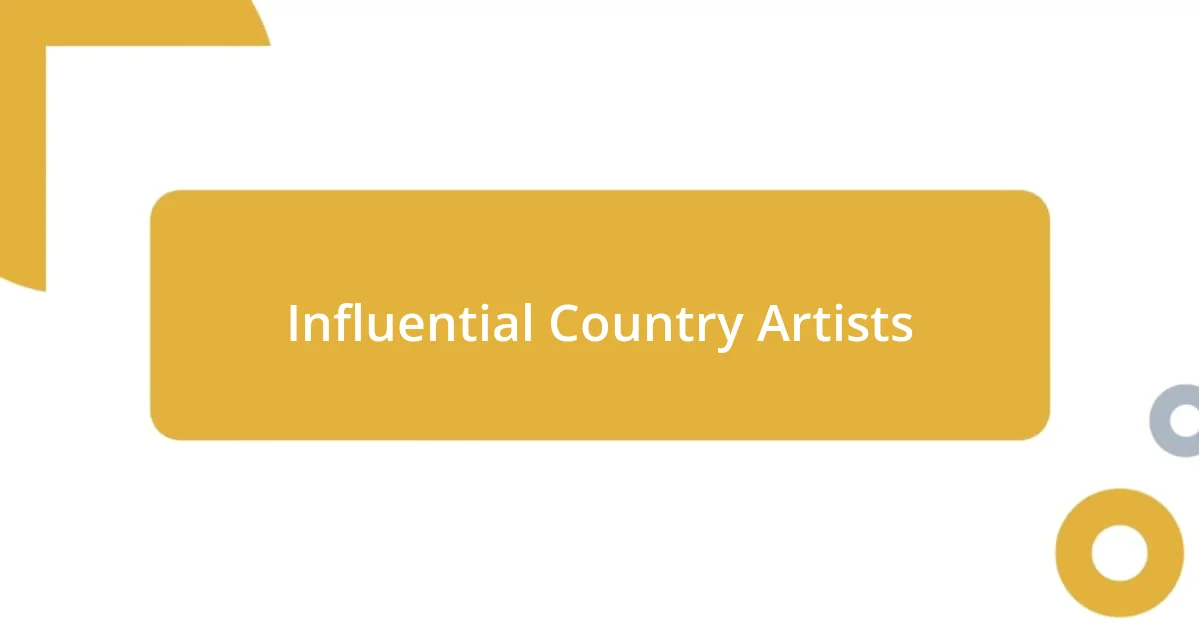
Influential Country Artists
While exploring the landscape of influential country artists, I can’t help but think of Hank Williams. His raw and heartfelt songwriting not only defined traditional country music but also influenced countless artists across various genres. I recall driving through the countryside, classic Hank tunes playing on the radio, the lyrics capturing a sense of longing and heartache that resonated deeply with me. His ability to encapsulate human emotion in a few simple lines is nothing short of remarkable.
Then there’s Loretta Lynn, a powerhouse whose songs tackled social issues head-on. I remember my first reaction to her song “Coal Miner’s Daughter” — it was like opening a window into her life, revealing the struggles and triumphs of working-class families. Lynn’s authenticity and willingness to speak about her experiences carved a path for women in country music, inspiring a new generation of female artists. It’s profound how her voice offered not just entertainment, but a sense of empowerment.
Lastly, I must mention the modern-day giant, Chris Stapleton, whose soulful blend of country, blues, and rock is reshaping the genre. The first time I heard “Tennessee Whiskey,” it sent shivers down my spine; the emotional depth in his voice is something that lingers long after the song ends. His artistry serves as a perfect example of how contemporary country artists are honoring the past while pushing the genre forward. Isn’t it fascinating how each artist, in their own unique way, continues to weave the rich tapestry of country music?
| Artist | Contribution |
|---|---|
| Hank Williams | Defined traditional country music with raw emotion and simple yet profound lyrics. |
| Loretta Lynn | Pioneered women’s representation in country music, addressing social issues in her songs. |
| Chris Stapleton | Blends genres to reshape modern country with soulful songwriting and powerful vocals. |
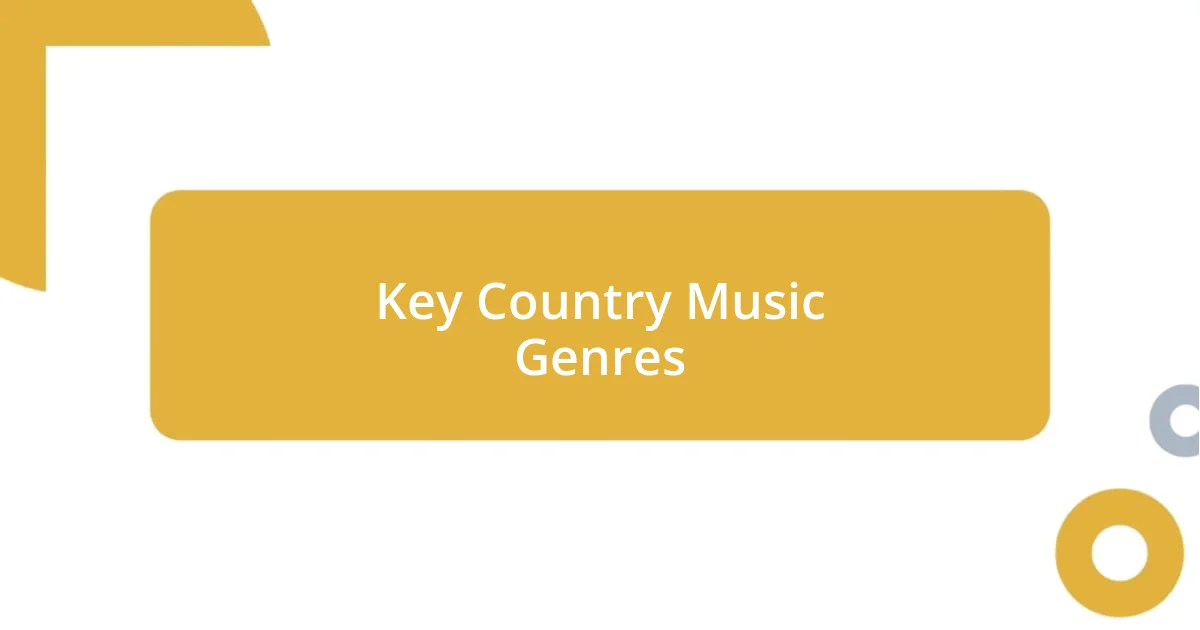
Key Country Music Genres
While exploring the evolution of country music genres, I find it striking how each subgenre tells its own unique story. For example, bluegrass emerged in the mid-20th century, characterized by its focus on acoustic instruments and complex harmonies. I remember sitting on my porch, listening to Bill Monroe’s high, lonesome sound, feeling a connection to the mountain traditions that shaped his music. Think of it as a musical journey through the Appalachian woods — every chord evokes images of nature and simpler times.
Here’s a brief look at key country music genres:
- Traditional Country: Emphasizes storytelling with simple melodies, often highlighting heartbreak and everyday struggles.
- Bluegrass: Defined by fast-paced, intricate instrumentation — banjos and fiddles take center stage.
- Outlaw Country: A rebellion against the mainstream, bringing a raw, edgy sound with artists like Willie Nelson and Waylon Jennings.
- Country Pop: Blends country with pop elements, creating crossover hits, exemplified by artists such as Taylor Swift and Shania Twain.
- Americana: A more modern genre, mixing country with rock, folk, and blues, celebrating a diverse musical heritage.
Thinking of these genres reminds me of a friend who introduced me to Americana. It felt like discovering hidden gems, each song resonating with a unique perspective and authenticity. I quickly realized that country music isn’t just a genre; it’s a way of life, a reflection of the experiences we all share.
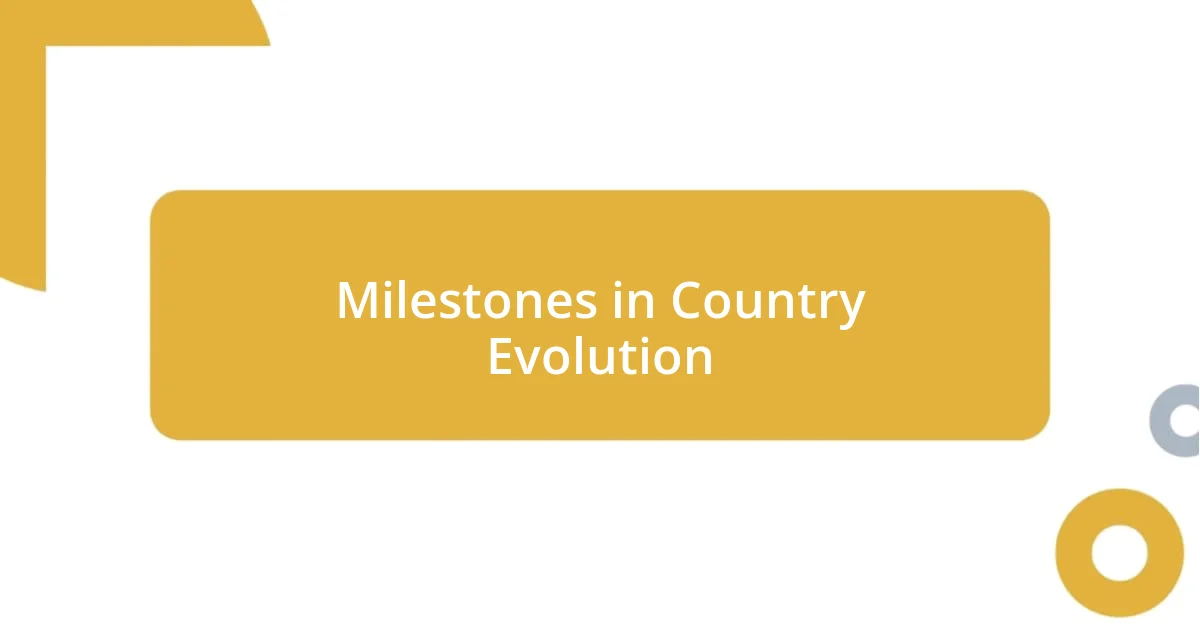
Milestones in Country Evolution
When I think about key milestones in country music evolution, one event stands out: the emergence of the Grand Ole Opry in the 1920s. This radio show not only brought country music into American living rooms but also created a sense of community among artists and fans alike. I can almost picture families gathering around their radios, tapping their feet to the sounds of their favorite artists, connecting through music in a way that felt intimate and transformative.
Another significant milestone occurred in the 1960s with the rise of the Nashville sound, which introduced smoother production and pop influences into country music. I remember listening to Patsy Cline’s “Crazy” for the first time. Her voice seemed to wrap around me like a warm blanket, blending heartbreak with beauty. It made me realize how innovations in sound can elevate storytelling in music, allowing listeners to experience emotions on a deeper level.
Fast forward to the late 2000s, and we see the emergence of mainstream country artists embracing hip-hop elements, like in Florida Georgia Line’s chart-topping hits. This shift sparked a vibrant fusion of styles that challenged traditional boundaries. I vividly recall a summer road trip where “Cruise” played on repeat, making it impossible not to sing along. It’s intriguing how such milestones create new conversations about what country music can be, continually reshaping the genre while honoring its roots.
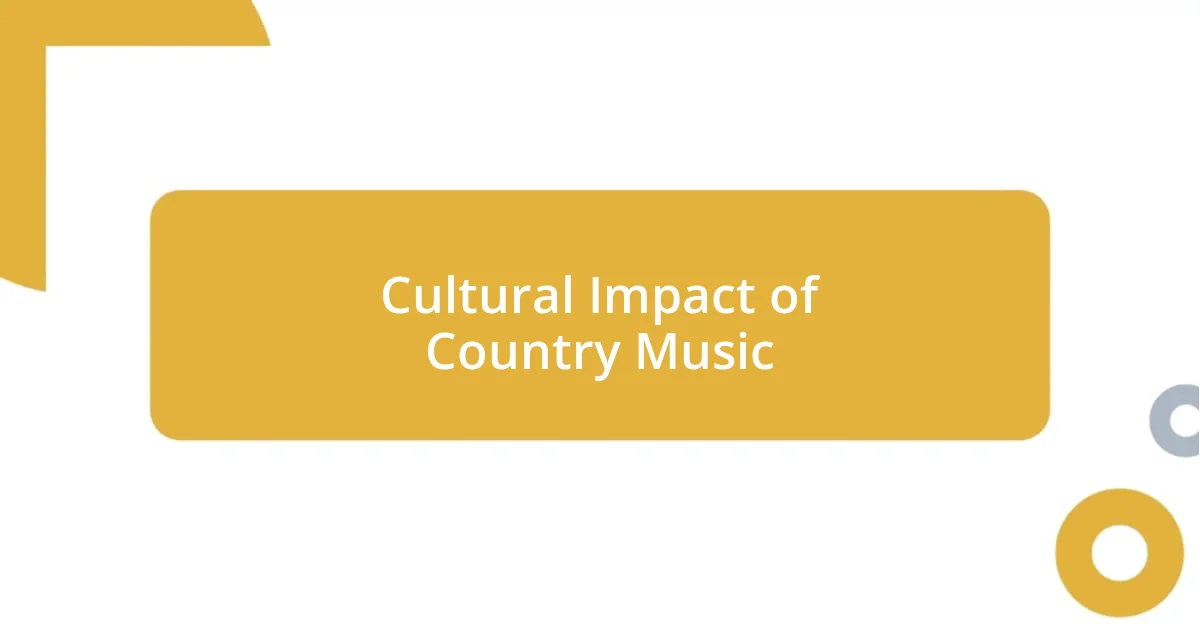
Cultural Impact of Country Music
Country music’s cultural impact runs deep, intertwining with the fabric of American life. It’s a genre that has given voice to the struggles and joys of everyday people, offering a soundtrack to significant life moments. I still remember cranking up John Denver’s “Take Me Home, Country Roads” during a blissful road trip with friends. We belted those lyrics out, feeling a powerful connection to home and the countryside, all while creating memories that would linger long after the trip ended.
One of the most fascinating aspects of country music is its ability to bridge gaps between communities. It captures the essence of shared experiences, celebrating themes like love, loss, and resilience. I find it remarkable how a song like Dolly Parton’s “Jolene” resonates regardless of age or background. There’s something universally relatable about the feelings of vulnerability and heartache she expresses — it’s as if she’s inviting listeners to share in her story, reflecting our very own emotions in the process.
Moreover, country music has played a crucial role in social change. From the civil rights movement, when artists like Johnny Cash stood in solidarity with marginalized communities, to contemporary songs addressing issues like mental health and gender equality, the genre has evolved to speak on important societal topics. Listening to artists like Maren Morris challenges us to think critically about issues we face today. I remember feeling empowered while singing along to her anthem “Girl,” a reminder that we can all strive for equality and uplift one another. Isn’t it refreshing how music can inspire change, one lyric at a time?
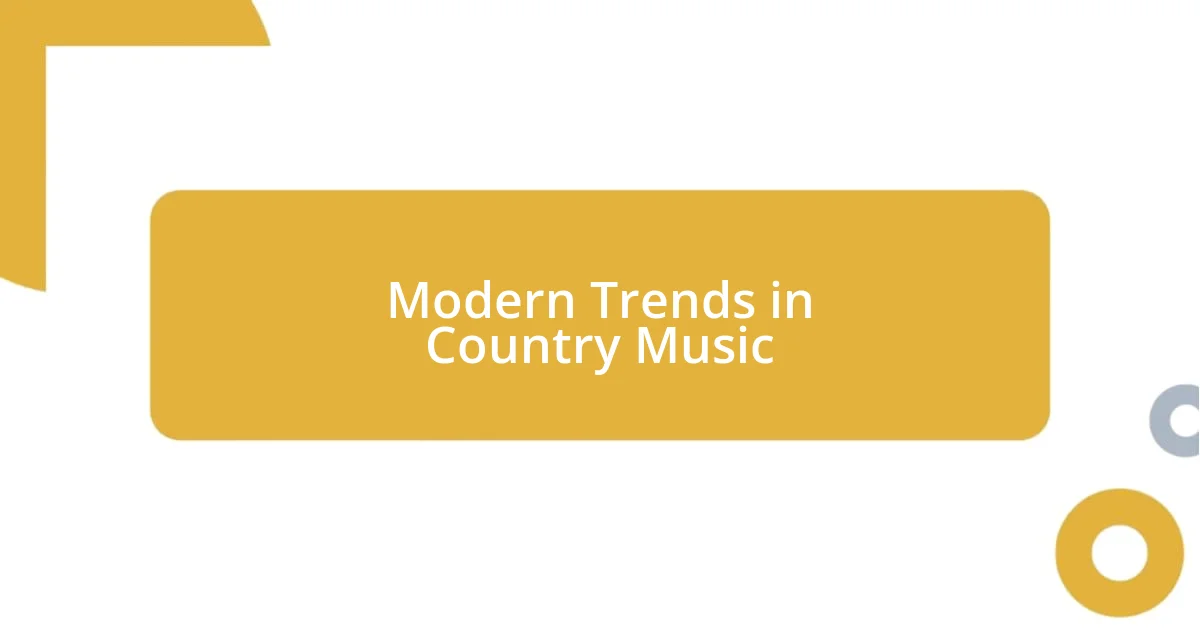
Modern Trends in Country Music
The modern landscape of country music is fascinating, especially with the growing blend of genres. I’ve noticed artists like Kacey Musgraves carving out their unique niche by embracing pop influences and addressing contemporary themes in their lyrics. Her album “Golden Hour” felt like a breath of fresh air — it’s upbeat yet deeply reflective. When I listen to tracks like “Butterflies,” I can’t help but feel the warmth of love and nostalgia wash over me.
A noteworthy trend is the increasing representation of diverse voices in the genre. Artists such as Mickey Guyton are breaking barriers by sharing their stories, which adds depth and richness to the music. I remember watching her perform “Black Like Me” and feeling an overwhelming pride for the strides country music is making toward inclusivity. It makes me wonder, how much more powerful could country music become as it continues to embrace a broader range of experiences?
Additionally, technology is reshaping how country music is created and consumed. With platforms like TikTok influencing music trends, we see songs gaining viral popularity overnight. I can still recall discovering new tracks through catchy snippets while scrolling through my feed, which sparked conversations with friends about our favorite songs. Isn’t it incredible how a single post can spark a musical journey, connecting us all in unexpected ways?
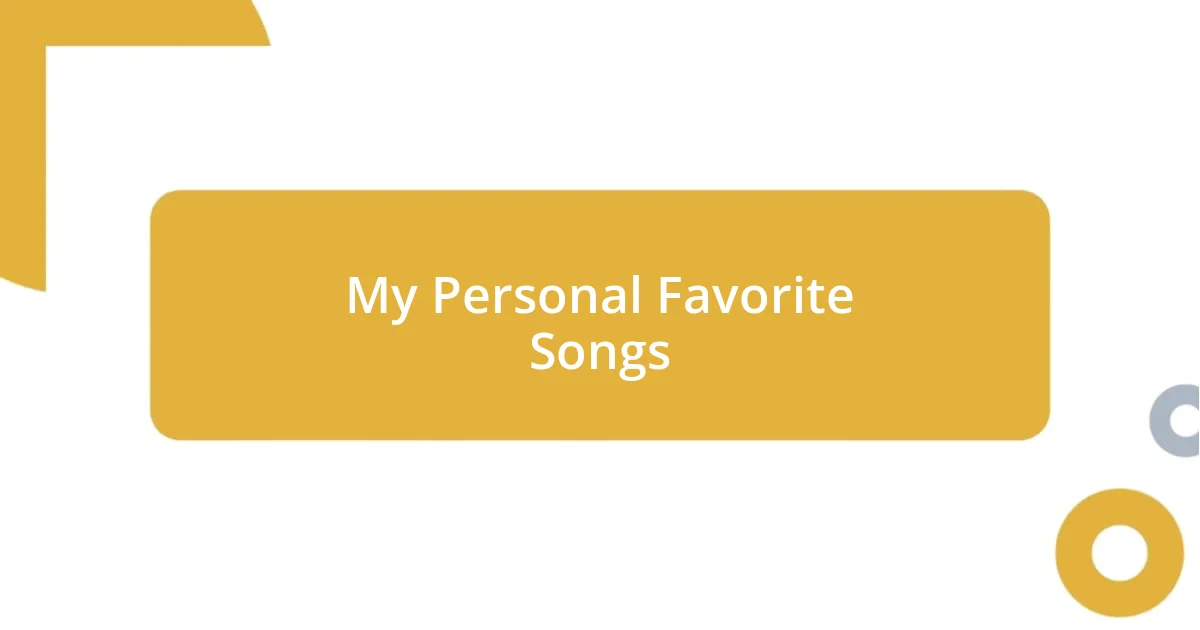
My Personal Favorite Songs
One of my all-time favorite country songs has to be “Friends in Low Places” by Garth Brooks. I still get a kick out of how it perfectly captures that feeling of being an underdog at a glamorous gathering. I remember a karaoke night when my friends and I jumped up, drinks in hand, and belted it out like we were on stage at the Grand Ole Opry. The camaraderie in those moments is unforgettable — it reminds me that, regardless of life’s challenges, good friends can turn any situation into a celebration.
I also adore “The Gambler” by Kenny Rogers. It’s a classic story set to music that teaches life lessons wrapped in clever metaphors. I often find myself reflecting on the line, “You’ve got to know when to hold ’em, know when to fold ’em.” It resonates with me personally, pushing me to think about choices in my own life, particularly during uncertain times. At times, don’t we all wish we had that kind of wisdom to guide our decisions?
And let’s not forget about “Wagon Wheel” by Old Crow Medicine Show. Whenever I hear it, I can’t help but be transported back to those lazy summer evenings sitting around a campfire with friends. The simple, repetitive chorus makes it impossible not to join in, and the sense of community it fosters is magical. It makes me wonder, isn’t it amazing how certain songs can evoke such strong memories and emotions, serving as the soundtrack to our lives?
